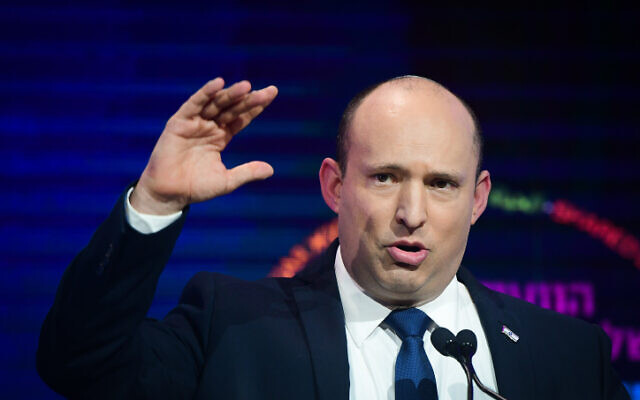Prime Minister Naftali Bennett arrived Friday for a lightning visit to Sochi to meet with Russian President Vladimir Putin for talks expected to focus on Iran and Syria.
Bennett will only be in the Russian resort city for about five hours, during which he’ll hold his first meeting with the Russian leader since entering office before jetting back to Israel Friday afternoon before the start of Shabbat at sundown. The leaders also spoke two weeks ago when Bennett congratulated Putin on his 69th birthday.
“The two will discuss a series of diplomatic, security and economic issues involving both countries, as well as important regional matters, primarily Iran’s nuclear program,” the Prime Minister’s Office said when the visit was announced several days ago. His spokesperson said the trip came at Putin’s invitation.
Speaking from the tarmac before taking off, Bennett touted the importance of ties with Moscow, which Israel sees as a major regional player due to its support for Syrian President Bashar Assad and the influence it wields over Tehran.
“The ties between Russia and Israel are a significant pillar of Israel’s foreign policy, both because of Russia’s special position in the region and its international status, and also because there are a million Russian speakers in Israel who are a bridge between the two countries,” he said in a video distributed by his office.
“In general, the foreign policy and international status of Israel are significantly strengthening. There is considerable energy and the direction is very good,” he added.
Bennett’s predecessor Benjamin Netanyahu boasted of a close relationship with Putin, which he claimed created the space for Israel to wage a years-long air campaign against Iran-backed fighters in Syria. That campaign has continued under Bennett, though recent reports have pointed toward tensions in the Israel-Russia relationship over policies toward Syria.
Russia is also a member of the P5+1 group of countries that negotiated the Iran nuclear deal, with talks on the US rejoining the moribund pact possibly set to resume sometime soon, according to officials.
Israel has lobbied against the resumption of the deal and pushed for a concerted international effort to keep Iran from developing nuclear weapons. On Thursday, Finance Minister Avigdor Liberman, whose political base is largely made up of Russian speakers from the former Soviet Union, said a military clash with Iran was “only a matter of time.”
The Kremlin has acknowledged that Bennett will likely not have the same rapport with Putin that Netanyahu did.
“We try not to compare Mr. Netanyahu to the current Prime Minister because Netanyahu worked with President Putin for lots of years and they knew each other very well and it takes time to develop new personal relationships,” Kremlin spokesman Dmitry Peskov told i24News.
While Bennett will be hoping to get Putin to use his influence to curb Iran, the challenge was highlighted by Moscow hosting Iran’s military chief of staff just days before Bennett’s visit.
After meetings with his Russian counterpart, Major General Mohammad Hossein Baqeri hailed the close military ties between Tehran and Moscow.
Bennett’s visit follows a trip by his foreign minister Yair Lapid to Moscow last month, where he met with his Russian counterpart Sergei Lavrov.
The Walla news site later reported that during that meeting, Lavrov asked for Israel to push the United States to agree to hold trilateral talks on the ongoing conflict in Syria.

Israel’s freedom of action in Syria was seriously curtailed after Russia provided advanced S-300 air defense batteries to Syrian President Bashar Assad’s forces following a 2018 incident in which the Syrian army, aiming at Israeli jets, knocked a Russian plane out of the sky instead, killing all 15 people on board.
Israel has carried out hundreds of airstrikes inside Syria in the course of the country’s civil war, targeting what it says are suspected arms shipments believed to be bound for Lebanon’s Iran-backed Hezbollah terror group, which is fighting alongside Syrian government forces. Israel rarely acknowledges or discusses such operations.
“The military and defense relations have grown remarkably in recent years, and we hope that the growing course of cooperation would continue,” Iran’s Tasnim news agency quoted him as saying.
RSS Feed by timesofisrael.com




